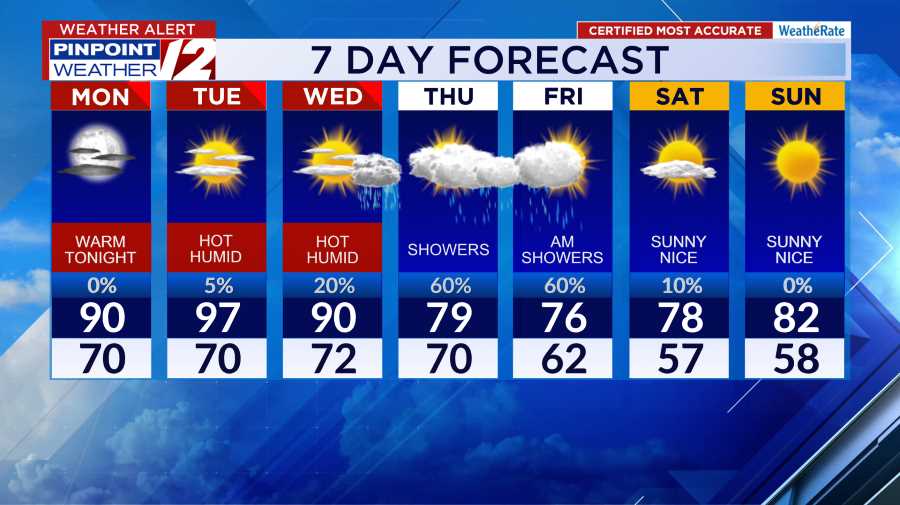PROVIDENCE, R.I. (WPRI) — May is Mental Health Awareness Month, but for those desperately seeking help, state data shows it can take hours, even days, before they receive treatment.
“Definitely an acute problem we’re facing right now,” said Andrea McGinn, associate chief nursing officer at Butler Hospital.
Nearly every day, there are dozens of people stuck in hospital emergency rooms in Rhode Island, waiting to receive access to behavioral health treatment. What many of them need are in-patient psychiatric beds at other facilities, which have been in short supply for months.
“Because that position or placement isn’t available, they end up waiting in the emergency department, because that’s safer for them than if they were just released into the care of a family member,” said Ryan Erickson, chief of staff at the R.I. Department of Behavioral Healthcare, Developmental Disabilities & Hospitals.
If you or someone you know is in crisis, seek immediate help:
Crisis Text Line: Text HOME to 741741 from anywhere in the USA, anytime, about any type of crisis
National Suicide Prevention Lifeline: (800) 273-TALK: (800) 273-8255
It’s a process called “emergency department boarding,” happening at hospitals across the state and the country — a problem that’s only gotten worse throughout the pandemic.
“There sometimes are patients that are waiting for days, a couple of days or more, in an emergency department to get to an appropriate bed,” McGinn said. “We don’t like to see that.”

According to state data, since June 2020, there have been an average of around two dozen people waiting in the emergency department for inpatient behavioral health care on any given day.
In the fall of 2021, that number spiked to more than 50 on average.
State data shows most of the time, more than half of the people waiting have been there longer than 12 hours.
“That’s certainly a concern,” Erickson said. “It could result in people declining to get care, maybe leaving even though they need it.”
BHDDH has a website that shows how many beds are open at facilities, as well as how many patients are waiting for treatment. The information is self-reported by hospitals, but provides a look at real-time conditions. Hospital leaders address the issue on a daily basis.
“We are in touch with all the EDs in the state … on a call every morning, where we share info about the number of patients that are boarding, beds available, and how we can best accommodate them,” McGinn said.
One reason for the lack of beds is the ongoing staffing shortages plaguing hospitals, which forces them to scale back how many are available. Hospitals and treatment facilities have also been operating under COVID spacing and isolation guidelines for congregate care settings.
“I think we’re managing on a sort of shift-to-shift basis to try to keep our access open,” McGinn said.
There is also a sharp rise in demand for treatment, especially among young people.
“Increased isolation, increased pressures we’ve all felt as a result of COVID-19,” Erickson said. “People with serious mental illness or substance use disorder, it was a particularly traumatic experience. It’s driven a lot more need for these treatment resources as well.”
“People are struggling in so many ways,” McGinn said. “I think there’s a greater acceptance of people receiving care. Couple that with people that need it, you see more people reaching out.”
“It‘s wonderful that people feel comfortable and feel there are resources available,” McGinn added. “Now we need to make sure the access is there and the beds are there.”
Fixing the problem is complex. Erickson says the state is working to invest more money in community-based mental health services and to give bonuses using federal funds to behavioral health care workers.
The state is also getting ready to launch a new “988” crisis hotline by this summer, connecting people to mental health services in their community.
Still, local experts believe those solutions are only the beginning.
“We are looking at a pretty significant long-term effect of COVID on Rhode Islanders’ mental health, and on substance use,” Erickson said. “We’re expecting a pretty significant need for these services, and we’ve got a lot of work to do to meet that need.”
Both Erickson and McGinn emphasized that there are resources available to people who need them, and that you should reach out immediately if you need help, whether it be to just talk to someone or access behavioral health treatment services.



















